Ever felt that embarrassing moment when white flakes cascade onto your dark shirt? You’re not alone. Dandruff affects roughly 50% of adults, creating frustrating scalp challenges that go beyond simple hair care.
Dandruff isn’t just about occasional skin shedding. It’s a complex condition driven by genetics, scalp microbes, and environmental triggers. Knowing these causes can help you find an effective treatment that restores your scalp’s health.
This guide will walk you through everything you need to know about how to get rid of dandruff. We’ll cover identifying causes and exploring proven treatment options. We aim to help you regain your scalp’s confidence and comfort.
Whether you’re battling persistent white flakes or occasional scalp irritation, our approach will offer practical solutions. These solutions are tailored to your unique scalp needs. Let’s dive into understanding and conquering dandruff once and for all.
Table of Contents
Understanding Dandruff: An Overview
Dandruf is a common scalp condition that affects millions of people worldwide. Knowing about it can help you take better care of your scalp. It also helps you find the best ways to fix a flaky scalp.
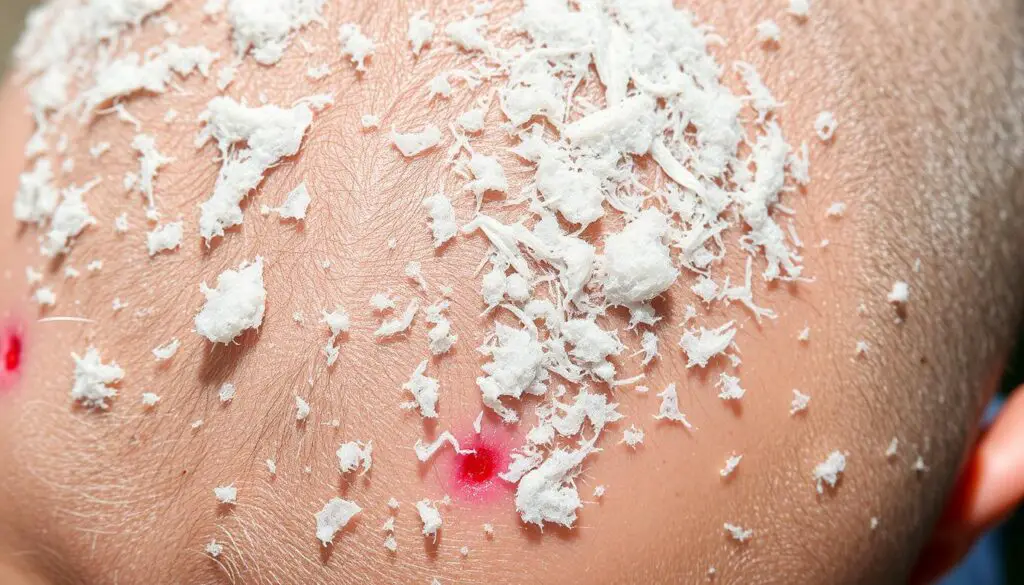
About 50% of adults get dandruff at some point. Men are more likely to get it, with up to 70% experiencing symptoms. Women are less affected, but still suffer from it.
What is Dandruff?
Dandruff is a mild form of seborrheic dermatitis. It shows as white or yellowish flakes that fall off the scalp. It’s not just dry skin. It’s a complex condition caused by several factors:
- Overgrowth of malassezia yeast
- Oily skin production
- Inflammatory skin reactions
- Hormonal changes
Common Myths About Dandruff
Let’s clear up some common misconceptions about dandruff:
| Myth | Reality |
|---|---|
| Dandruff is caused by poor hygiene | Only 15% of cases are related to washing frequency |
| Dandruff is contagious | It cannot be passed from person to person |
| Dandruff only affects adults | 42% of infants can develop seborrheic dermatitis |
“Understanding dandruff is the first step to effective scalp care and finding the right treatment.”
Stress, weather, and some hair products can make dandruff worse. Using anti-dandruff shampoo regularly can help 80% of people in two weeks.
Causes of Dandruff
Dandruff is a common scalp condition that affects millions of people worldwide. Knowing what causes it can help you find good treatments. Let’s look at the main reasons for this frustrating condition.
Dry Skin and Scalp Conditions
Your scalp’s health is key to avoiding dandruff. Dry skin can lead to flaking and irritation. In fall and winter, the cold and dry air make these problems worse.
- Environmental factors play a significant role in scalp health
- Cold weather increases the likelihood of dry, flaky skin
- Individuals with sensitive skin are more prone to dandruff
Oily Skin and Sebaceous Gland Activity
Both dry and oily skin can lead to dandruff. Too much oil from sebaceous glands creates a perfect spot for fungi to grow.
| Scalp Type | Dandruff Likelihood | Recommended Action |
|---|---|---|
| Oily Scalp | High | Use zinc pyrithione shampoo |
| Dry Scalp | Moderate | Hydrating anti-dandruff treatments |
Fungal Infections and Malassezia
The yeast-like fungus Malassezia is a main cause of dandruff. When it grows too much, it causes more skin cells to fall off and irritation.
“The presence of Malassezia is normal, but its overgrowth triggers dandruff symptoms.” – Dermatology Research Institute
Underlying Skin Conditions
Some medical conditions can lead to dandruff. Seborrheic dermatitis, psoriasis, and eczema often show similar symptoms on the scalp.
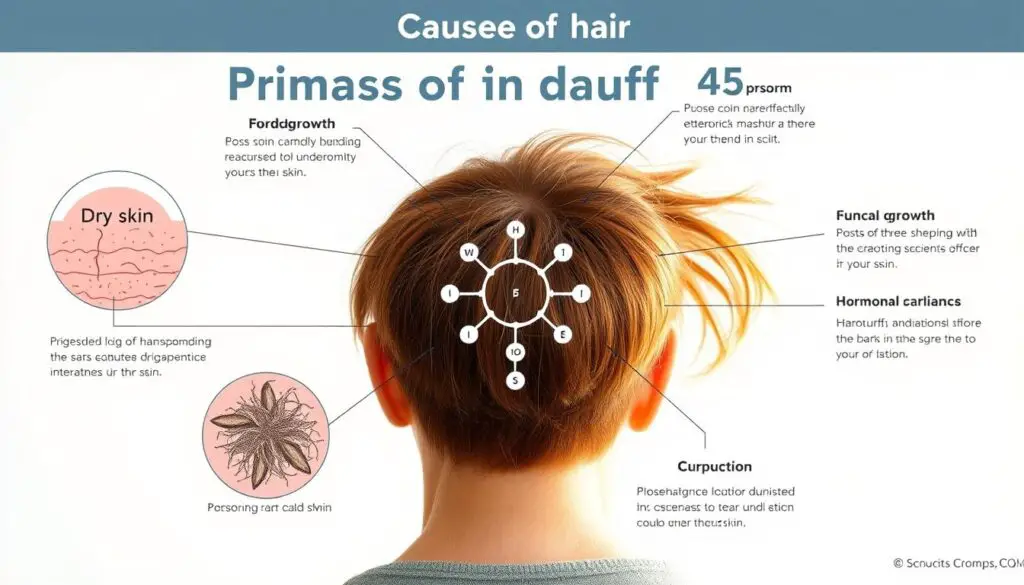
While dandruff is common, if it doesn’t go away, you should see a doctor. Men are more likely to get it, and people with weak immune systems may have worse cases.
Symptoms of Dandruff
Dandruff is a common scalp condition that affects about 50% of adults worldwide. Knowing its symptoms helps you tackle it effectively.
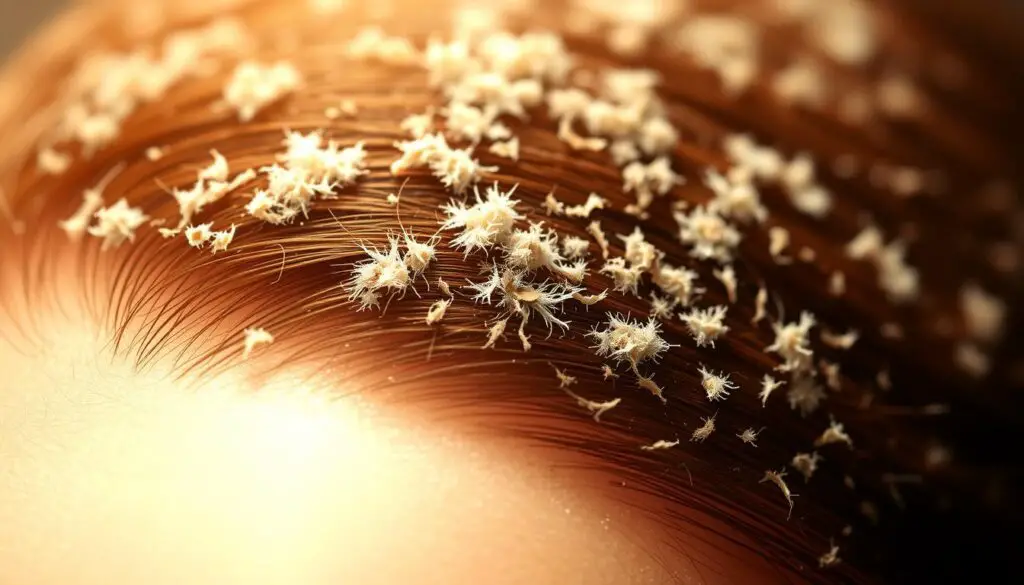
Recognizing Flaky Scalp Signs
A flaky scalp is the most obvious sign of dandruff. You’ll see white or yellow flakes that:
- Fall onto your shoulders
- Get worse when you scratch your head
- Can be small or large, oily patches
Understanding Itchy Scalp Solutions
An itchy scalp is another key sign of dandruff. The urge to scratch can cause more irritation and skin damage. Solutions for a flaky scalp often aim to stop this itchiness.
| Symptom | Characteristics | Potential Impact |
|---|---|---|
| Flakes | White or yellow | Visible on clothing |
| Itching | Persistent scalp irritation | Increased skin sensitivity |
| Scalp Condition | Oily or dry patches | Potential skin inflammation |
Red or Greasy Patches
Some people also see red or greasy patches on their scalp. Males tend to have more severe dandruff symptoms, especially with oily skin.
“Dandruff symptoms can vary widely between individuals, making personalized treatment crucial.” – Dermatology Experts
If you’re dealing with persistent dandruff, see a healthcare professional. They can offer specific solutions for your itchy and flaky scalp.
How to Diagnose Dandruff
Understanding dandruff means paying close attention to your scalp. Many people deal with dandruff. Knowing its signs helps find the right treatment.
Self-Diagnosis Techniques
To spot dandruff, look at your scalp and its symptoms. Here are some tips:
- Check for flake characteristics: Dandruff flakes are big, oily, and white or yellow
- Assess scalp condition: Look for itchiness, redness, or scaly patches
- Track flake frequency: See how often flakes show up on your shoulders or clothes
- Monitor scalp oiliness: Dandruff often means an oily scalp
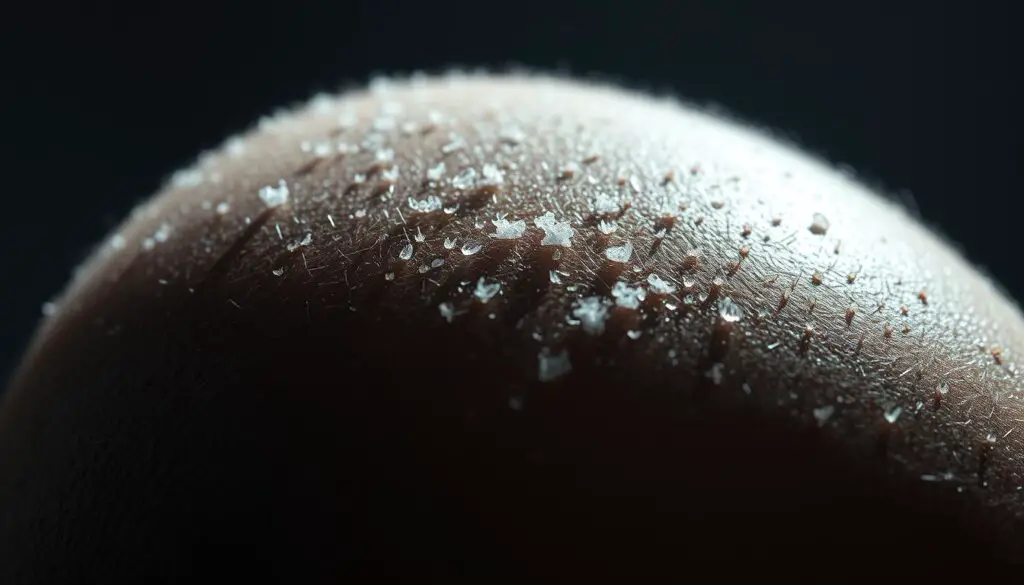
When to See a Dermatologist
Most dandruff can be treated at home. But, some cases need a dermatologist. See a doctor if you have:
- Persistent symptoms after 4-6 weeks of over-the-counter treatments
- Severe scalp inflammation or intense itching
- Signs of potential skin infections
- Unexplained hair loss with dandruff
*About 10% of people need a doctor for chronic scalp issues.*
A dermatologist can tell dandruff from other scalp problems like seborrheic dermatitis or psoriasis. They offer treatments that fit your scalp’s needs.
| Symptom | Self-Treatment | Professional Consultation |
|---|---|---|
| Mild Flaking | Anti-dandruff shampoo | Optional |
| Persistent Itching | Scalp moisturizers | Recommended |
| Severe Inflammation | Not advised | Immediate |
Early detection and good scalp care are key to managing dandruff.
Home Remedies for Dandruff
Dealing with dandruff can be frustrating, but natural remedies offer effective scalp care solutions. Explore these home treatments that can help manage dandruff and restore your scalp’s health.

Natural dandruff treatments provide gentle alternatives to commercial products. These home remedies can help control flaking and soothe an irritated scalp.
Tea Tree Oil Treatment
Tea tree oil is a powerful natural remedy for dandruff treatment. Its antifungal properties can help combat the yeast responsible for scalp irritation. Here’s how to use it:
- Mix 10-15 drops of tea tree oil with your regular shampoo
- Use the mixture 2-3 times per week
- Massage gently into the scalp
Apple Cider Vinegar Rinse
Apple cider vinegar is an excellent natural remedy for dandruff. Its acidic nature helps balance scalp pH and reduce fungal growth.
- Create a mixture of 1 part vinegar to 1 part water
- Apply after shampooing
- Rinse thoroughly
- Use up to twice weekly
Coconut Oil Treatments
Coconut oil offers multiple benefits for scalp care. Its antimicrobial properties can help reduce fungal infections while moisturizing the scalp.
- Warm coconut oil slightly
- Massage into the scalp
- Leave for 1-2 hours
- Wash out with mild shampoo
- Repeat twice weekly
“Nature provides some of the most effective solutions for scalp health and dandruff management.” – Dermatology Research Institute
Remember that individual results may vary. If symptoms persist, consult a healthcare professional for personalized advice on dandruff treatment.
Over-the-Counter Treatments
Dealing with dandruff can be frustrating. But, over-the-counter treatments offer effective solutions. Finding the right anti-dandruff shampoo can greatly improve your scalp health and reduce embarrassing flakes.
Understanding Antifungal Shampoos
Antifungal shampoos are a key treatment for dandruff. They target the root cause of most scalp issues. These products contain ingredients that fight the malassezia fungus responsible for dandruff.
- Ketoconazole: Highly effective antifungal ingredient
- Zinc Pyrithione: Reduces scalp inflammation
- Selenium Sulfide: Controls excessive skin cell growth
- Salicylic Acid: Helps remove dead skin cells
Top Anti-Dandruff Shampoo Recommendations
When looking to get rid of dandruff, consider these proven options:
| Brand | Key Ingredient | Usage Frequency |
|---|---|---|
| Head & Shoulders Clinical Strength | Selenium Sulfide | Twice per week |
| Neutrogena T/Sal | 3% Salicylic Acid | Daily use |
| Jupiter Balancing Shampoo | 1% Zinc Pyrithione | Twice per week |
“Consistency is key when treating dandruff. Most shampoos require 2-3 weeks of regular use to see significant improvements.” – Dermatology Experts
Always follow the product instructions carefully. If you don’t see improvement after several weeks, talk to a healthcare professional. They can help find other dandruff treatments.
Prescription Treatments for Dandruff
When over-the-counter treatments don’t work, you might need prescription help. Severe dandruff needs strong medical care to clear it up.
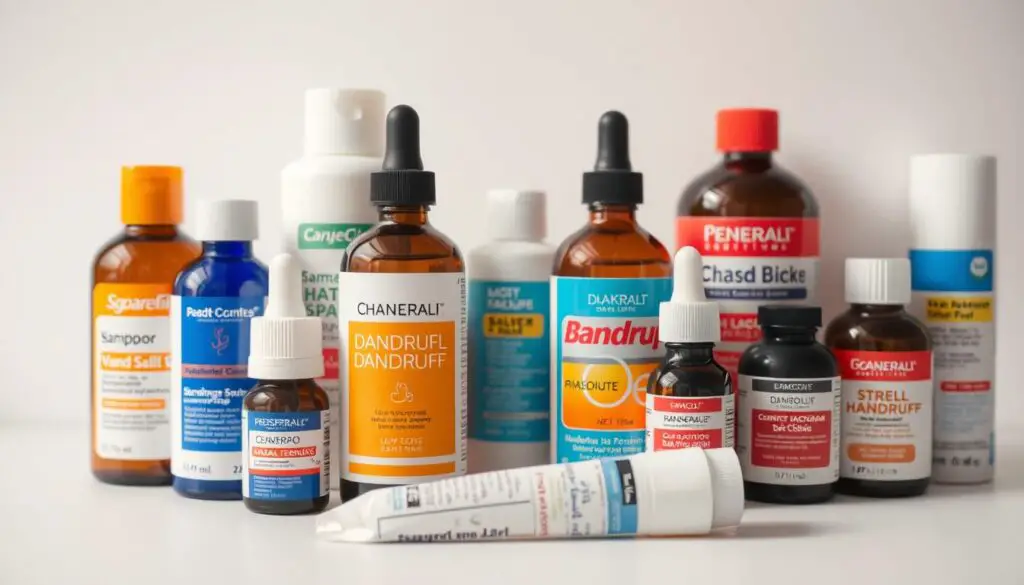
Prescription treatments are strong for tough dandruff. Dermatologists offer special medicines that go beyond what you can buy.
Prescription Shampoos
Medicated shampoos are key for professional treatment. They have strong ingredients that target scalp problems:
- Ketoconazole shampoo – Reduces Malassezia furfur fungus by up to 90%
- Zinc pyrithione formulations – Normalizes scalp oil production
- Selenium sulfide solutions – Decreases skin cell growth and fungal development
Topical Corticosteroids
For serious inflammation, doctors might suggest topical corticosteroids. Fluocinolone is often used to lessen itching and redness from stubborn dandruff.
“Prescription treatments can provide targeted relief when standard approaches fall short” – Dermatology Research Institute
Your doctor will pick a treatment based on:
- How bad your scalp condition is
- If you have sensitive skin
- How you reacted to treatments before
Using the treatment as directed, usually two to three times a week, can help. Most people see big improvements in four weeks.
Lifestyle Changes to Prevent Dandruff
Preventing dandruff is more than just using special shampoos. Your lifestyle is key to keeping your scalp healthy and reducing itchiness. Knowing how diet, stress, and daily habits affect your scalp can greatly improve your hair’s condition.
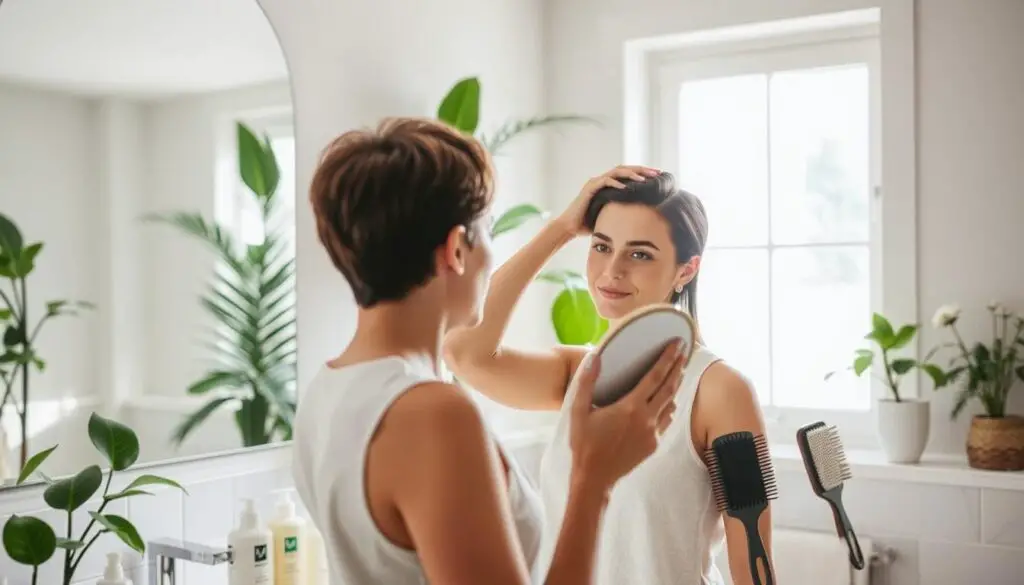
Nutrition and Diet for Scalp Health
Your diet affects your scalp health and dandruff prevention. Some nutrients help fight scalp problems:
- Zinc-rich foods like pumpkin seeds and lean meats
- B-vitamin sources such as eggs and whole grains
- Omega-3 fatty acids from fish and nuts
Research shows omega-3 deficiency can lead to scaly, itchy skin. This shows how important good nutrition is for scalp care.
Stress Management Techniques
“Stress doesn’t cause dandruff, but it can make existing conditions worse.” – Dermatology Research Institute
Managing stress well can help your scalp health:
- Practice daily meditation
- Engage in regular exercise
- Maintain consistent sleep patterns
| Stress Management Strategy | Impact on Scalp Health |
|---|---|
| Meditation | Reduces cortisol levels |
| Exercise | Improves blood circulation |
| Proper Sleep | Supports immune system |
A 2023 study with 629 participants showed a strong link between stress and skin issues. This highlights the need for a holistic approach to scalp care.
By making these lifestyle changes, you can develop a full plan for preventing dandruff. This will help keep your scalp healthy and comfortable.
Scalp Hygiene Practices
Keeping your scalp clean is key to avoiding dandruff and ensuring your hair stays healthy. Since 50% of people deal with dandruff, knowing how to care for your scalp is vital. It greatly affects your hair’s look and health.
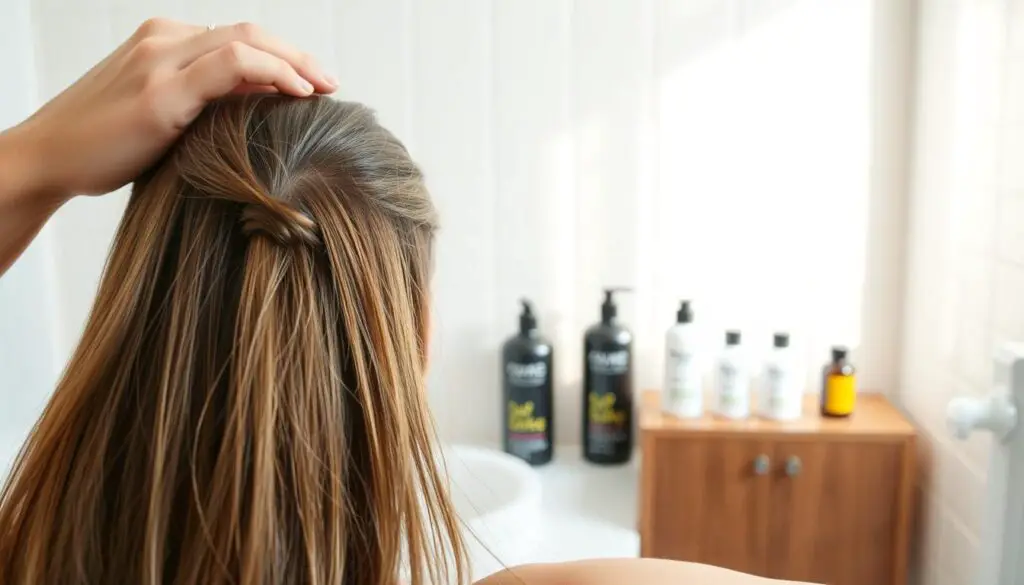
The Importance of Regular Washing
Your washing routine is crucial for fighting dandruff. The right approach depends on your scalp type:
- Oily scalps: Wash every other day
- Normal scalps: Wash every 2-3 days
- Dry scalps: Wash every 3-5 days
Choosing the Right Anti-Dandruff Shampoo
Picking the right anti-dandruff shampoo is vital for scalp health. Look for products with these ingredients:
| Ingredient | Benefit |
|---|---|
| Salicylic Acid | Helps remove dead skin cells |
| Zinc Pyrithione | Fights fungal growth |
| Ketoconazole | Reduces inflammation |
Additional Scalp Care Tips
There are more ways to keep your scalp healthy:
- Exfoliate twice weekly to remove buildup
- Use a humidifier to prevent dryness
- Massage your scalp to improve blood circulation
“Healthy scalp, healthy hair – it’s that simple.” – Dermatology Experts
By following these scalp care tips, you can prevent dandruff and keep your scalp healthy. Remember, consistency is key in caring for your hair.
Seasonal Factors Affecting Dandruff
Dandruff changes with the seasons. Knowing how weather affects your scalp is key for good scalp care.
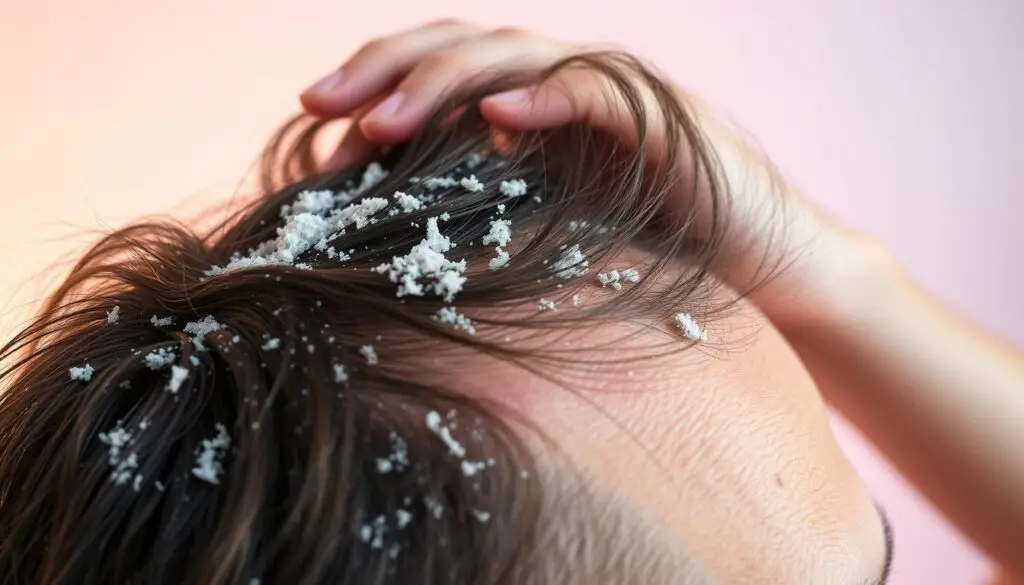
Your scalp changes a lot each year. Winter and summer are especially tough for keeping dandruff under control.
Winter’s Impact on Scalp Health
Winter’s dry air is hard on your scalp. Here’s what you need to know:
- Winter humidity can drop as low as 20%
- Over 50% of people experience increased dandruff in colder months
- Indoor heating systems further reduce moisture levels
Summer Humidity and Scalp Conditions
Summer brings its own scalp problems. High humidity can cause:
- Increased scalp sweating
- Higher oil production
- Potential fungal growth
Managing Seasonal Dandruff
| Season | Scalp Care Strategies |
|---|---|
| Winter | Use moisturizing shampoos, employ humidifiers, limit hot water washing |
| Summer | Frequent gentle washing, use lightweight anti-dandruff products |
For year-round scalp care, use zinc pyrithione shampoos. Stay hydrated and adjust your hair care with the seasons.
“Understanding your scalp’s seasonal needs is key to managing dandruff effectively.”
With the right strategies, you can keep dandruff at bay all year.
Connection Between Dandruff and Hair Health
It’s important to know how dandruff affects your hair health. Dandruff can make it hard to keep your scalp and hair looking good. It’s more than just flakes.
Dandruff doesn’t directly cause hair loss. But, it can make it harder to take care of your scalp and hair. Studies show dandruff can lead to:
- Increased scalp inflammation
- Potential damage to hair follicles
- Temporary hair shedding due to excessive scratching
Impact on Hair Growth
Dandruff can slow down hair growth in indirect ways. Scalp inflammation from dandruff can mess with hair growth cycles. About 50% of adults get dandruff, which can affect hair density.
| Dandruff Impact | Potential Hair Health Consequences |
|---|---|
| Scalp Inflammation | Up to 70% correlation with hair thinning |
| Excessive Scratching | 20-30% increase in hair shedding |
| Sebum Imbalance | 40% increased risk of hair brittleness |
Products to Avoid
Choosing the right products is key to scalp health. Some ingredients can make dandruff worse and harm your hair:
- Harsh sulfates
- Alcohol-based styling products
- Heavy silicone formulations
- Products with artificial fragrances
“Your scalp is the foundation of healthy hair. Treat it with care and attention.” – Dermatology Experts
Go for scalp-friendly products that keep your hair balanced. Anti-dandruff shampoos with zinc pyrithione can cut flakes by up to 85%. This helps keep your scalp and hair healthy.
Frequently Asked Questions About Dandruff
Dandruff is a common scalp problem that many face. Knowing the facts can help you deal with it better. Let’s look at some key questions about dandruff and how to treat it.
Can Dandruff Be Cured?
Dandruff can’t be cured forever, but it can be managed well. It’s a long-term scalp issue that needs ongoing care. About 50% of adults get dandruff at some time, making it a big issue.
- Consistent treatment helps control symptoms
- Regular use of anti-dandruff shampoos can minimize flaking
- Maintaining scalp health is key to managing the condition
Is Dandruff Contagious?
Dandruff is not contagious. It comes from different things, like:
- Excess oil production
- Fungal growth on the scalp
- Individual skin sensitivities
The fungus Malassezia globosa is key in dandruff. It’s found on most scalps but can cause problems when it grows too much.
“Understanding your scalp’s unique needs is the first step in effective dandruff management.” – Dermatology Experts
| Dandruff Characteristic | Description |
|---|---|
| Flake Appearance | Large, oily flakes (white or yellow) |
| Typical Causes | Excess sebum, fungal infection, stress |
| Treatment Effectiveness | 50-80% improvement with proper care |
If you’re trying to get rid of dandruff, remember that regular treatment and scalp care are key. If store-bought solutions don’t work, seeing a dermatologist can help.
Myths vs. Facts About Dandruff Treatments
Finding the right dandruff treatment can be tough, with many myths out there. It’s important to know the truth to manage dandruff well.
Common Misconceptions About Dandruff
Many think dandruff comes from not being clean enough. But, science says it’s more about skin issues and fungus. The American Academy of Dermatology says most people have fungus on their scalp. Only some get irritation and flakes.
- Myth: Dandruff means you’re not clean enough
- Fact: Dandruff is related to skin conditions and fungal presence
- Myth: Expensive anti-dandruff shampoo always works best
- Fact: Effective treatments depend on individual scalp conditions
Evidence-Based Treatments
Choose treatments backed by science. Over-the-counter shampoos with certain ingredients can help a lot.
| Active Ingredient | Treatment Effectiveness |
|---|---|
| Zinc Pyrithione | Reduces fungal growth |
| Ketoconazole | Powerful antifungal action |
| Selenium Sulfide | Controls scalp flaking |
Natural remedies like tea tree oil and coconut oil can also help. They’re good for scalp health. Remember, treating dandruff takes time and patience.
“Understanding your scalp’s unique needs is the first step in effective dandruff management.” – Dermatology Research Institute
If store-bought treatments don’t work, see a dermatologist. They can find out if you have a skin problem that needs special treatment.
Dandruff in Children and Teenagers
Scalp care is key in childhood and the teenage years when dandruff often shows up. Studies show dandruff gets more common as kids hit puberty. Hormonal changes make oil glands work more, leading to dandruff. Boys tend to get dandruff more than girls, with more severe scalp issues.
When it comes to treating dandruff in young ones, we need to be careful. Medicated shampoos with gentle ingredients like zinc pyrithione or selenium sulfide work well. It takes 2-3 weeks to see results. For really bad cases, a pediatric dermatologist might suggest special steroid lotions.
How often to use anti-dandruff shampoo depends on the scalp. Teenagers with oily hair might need to wash twice a week. Those with curly or coarse hair can get by with weekly treatments. Natural options like tea tree oil and coconut oil can also help without harsh chemicals.
Special Considerations for Young Scalp
It’s important to understand your child’s scalp health. Dandruff affects 15-20% of people, but kids can have different levels of severity. Keeping an eye on the scalp, staying clean, and using the right treatments can help manage dandruff.
Effective Treatments for Kids
Choosing the right dandruff treatment means thinking about scalp sensitivity and hair type. Go for mild, doctor-approved products that don’t irritate young scalps. Good scalp care, healthy eating, and managing stress can also help keep dandruff away.

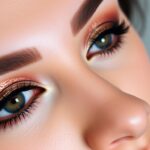
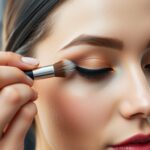
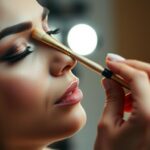



2 thoughts on “Dandruff Causes & How to Treat It Fast”